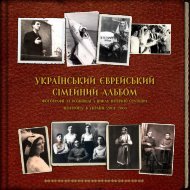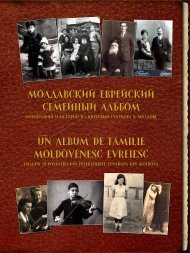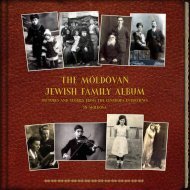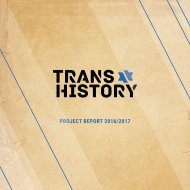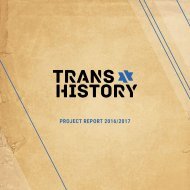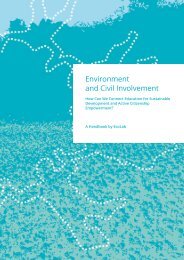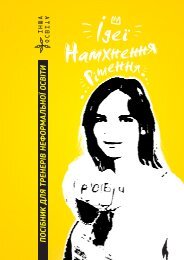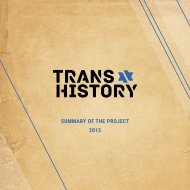TransHistory_The-Moldova-Jewish-Family-Album_exhibitio-panels_web
You also want an ePaper? Increase the reach of your titles
YUMPU automatically turns print PDFs into web optimized ePapers that Google loves.
THE MOLDOVA JEWISH FAMILY ALBUM<br />
PICTURES AND SToRIES FRoM THE CENTRoPA INTERVIEWS IN MOLDOVA<br />
THE MOLDOVA JEWISH FAMILY ALBUM<br />
PICTURES AND SToRIES FRoM THE CENTRoPA INTERVIEWS IN MOLDOVA
FAMILY<br />
Raisa Roitman<br />
Raisa Roitman<br />
Bella Chanina<br />
Bella Chanina<br />
Photo taken in: Rezina – 1913<br />
Interviewer: Zhanna Litinskaya<br />
Interview Location: Kishinev<br />
My great-grandfather, Itsik Rubel (left), was born<br />
in the 1840s in the town of Rezina. He lived there<br />
all his life. He had a large vineyard and worked on<br />
it by himself for the most part, occasionally hiring<br />
workers during the harvest time when it was too<br />
much for him. He sold his wine to the marketers<br />
from Kishinev. He died in 1930 when I was a small<br />
girl.<br />
Photo taken in: Rezina – 1913<br />
Interviewer: Zhanna Litinskaya<br />
Interview Location: Kishinev<br />
My great-grandfather, Itsik Rubel (left), was born<br />
in the 1840s in the town of Rezina. He lived there<br />
all his life. He had a large vineyard and worked on<br />
it by himself for the most part, occasionally hiring<br />
workers during the harvest time when it was too<br />
much for him. He sold his wine to the marketers<br />
from Kishinev. He died in 1930 when I was a small<br />
girl.<br />
Photo taken in: Kishinev – 1927<br />
Interviewer: Nathalia Fomina<br />
Interview Location: Kishinev<br />
This is a picture of me with my mother. My<br />
mother only had one dress, adjusting it with a<br />
brooch when she lost weight. She was beautiful<br />
– she had expressive black eyes and men really<br />
liked her, but she was very strict and imperious.<br />
My mother taught me to recite poems and<br />
I performed at school concerts only on the<br />
condition that she left the hall or I got confused,<br />
feeling her strict gaze on me.<br />
Photo taken in: Kishinev – 1927<br />
Interviewer: Nathalia Fomina<br />
Interview Location: Kishinev<br />
This is a picture of me with my mother. My<br />
mother only had one dress, adjusting it with a<br />
brooch when she lost weight. She was beautiful<br />
– she had expressive black eyes and men really<br />
liked her, but she was very strict and imperious.<br />
My mother taught me to recite poems and<br />
I performed at school concerts only on the<br />
condition that she left the hall or I got confused,<br />
feeling her strict gaze on me.<br />
Sarra Shpitalnik<br />
Sarra Shpitalnik<br />
Molka Mirskaya<br />
Molka Mirskaya<br />
Photo taken in: Kishinev – 1930<br />
Interviewer: Nathalia Fomina<br />
Interview Location: Kishinev<br />
This is me with my parents, Shlomo and Beila Molchanskiy, and their friends<br />
at Sobornyi Park. During Rosh Hashanah, my parents had friends visit us<br />
for a meal. We went to the town park after. This was the season of nuts and<br />
grapes, and we drank freshly squeezed grape juice. It foamed and was always<br />
wonderfully delicious. My grandmother was very religious, but we didn’t<br />
follow all of the customs.<br />
Photo taken in: Kishinev – 1930<br />
Interviewer: Nathalia Fomina<br />
Interview Location: Kishinev<br />
This is me with my parents, Shlomo and Beila Molchanskiy, and their friends<br />
at Sobornyi Park. During Rosh Hashanah, my parents had friends visit us<br />
for a meal. We went to the town park after. This was the season of nuts and<br />
grapes, and we drank freshly squeezed grape juice. It foamed and was always<br />
wonderfully delicious. My grandmother was very religious, but we didn’t<br />
follow all of the customs.<br />
Tamara Koblik<br />
Tamara Koblik<br />
Photo taken in: Kishinev – 1966<br />
Interviewer: Nathalia Fomina<br />
Interview Location: Kishinev<br />
This is me, Tamara Koblik, and my family. My husband, Monia, is holding our<br />
daughters, Ella and Sopha. Beside me is Allochka, our friend’s daughter.<br />
My husband and I rented a room for 20 rubles per month when his salary<br />
was 90 rubles and I wasn’t working. We actually lived in a room in a meat<br />
factory. <strong>The</strong>re was a stove to heat it, but the temperature never went above<br />
14 degrees.<br />
Photo taken in: Kishinev – 1966<br />
Interviewer: Nathalia Fomina<br />
Interview Location: Kishinev<br />
This is me, Tamara Koblik, and my family. My husband, Monia, is holding our<br />
daughters, Ella and Sopha. Beside me is Allochka, our friend’s daughter.<br />
My husband and I rented a room for 20 rubles per month when his salary<br />
was 90 rubles and I wasn’t working. We actually lived in a room in a meat<br />
factory. <strong>The</strong>re was a stove to heat it, but the temperature never went above<br />
14 degrees.<br />
Photo taken in: Kishinev – 1982<br />
Interviewer: Zhanna Litinskaya<br />
Interview Location: Kishinev<br />
<strong>The</strong>se are my parents, Tsivia and Yoyl Vaksman, during their golden<br />
wedding anniversary. <strong>The</strong> photo was taken in our apartment. In 1985,<br />
my father passed away without having the chance to rejoice in a greatgrandchild.<br />
In 1994, my mother died. When she got ill in the 1990s, I had<br />
to quit work to look after her. My husband and I didn’t observe religious<br />
traditions during the Soviet times, but my mother always did.<br />
Photo taken in: Kishinev – 1982<br />
Interviewer: Zhanna Litinskaya<br />
Interview Location: Kishinev<br />
<strong>The</strong>se are my parents, Tsivia and Yoyl Vaksman, during their golden<br />
wedding anniversary. <strong>The</strong> photo was taken in our apartment. In 1985,<br />
my father passed away without having the chance to rejoice in a greatgrandchild.<br />
In 1994, my mother died. When she got ill in the 1990s, I had<br />
to quit work to look after her. My husband and I didn’t observe religious<br />
traditions during the Soviet times, but my mother always did.
AT SCHOOL<br />
Zinoviy Sapunar<br />
Zinoviy Sapunar<br />
Photo taken in: Kishinev – 1927<br />
Interviewer: Nathalia Fomina<br />
When I was seven, my father sent me to a teacher so<br />
that I could learn how to play the violin. I didn’t have<br />
an ear for music. Once, my father asked me to play a<br />
piece for him. I did. He closed his ears with his hands<br />
and said, “God, how awful! As if an elephant has<br />
stepped on your ears!”<br />
Photo taken in: Kishinev – 1927<br />
Interviewer: Nathalia Fomina<br />
When I was seven, my father sent me to a teacher so<br />
that I could learn how to play the violin. I didn’t have<br />
an ear for music. Once, my father asked me to play a<br />
piece for him. I did. He closed his ears with his hands<br />
and said, “God, how awful! As if an elephant has<br />
stepped on your ears!”<br />
Bella Chanina<br />
Bella Chanina<br />
Photo taken in: Kishinev – 1929<br />
Interviewer: Nathalia Fomina<br />
This photo was a souvenir for my teachers at the Romanian school I<br />
attended. We all wore black robes at the school. <strong>The</strong>y lined us up so that<br />
the teacher could measure the length with a ruler – they had to be 30 cm<br />
from the floor. My mother was very strict about my studies at school. She<br />
even asked the teacher to be strict with me. I wasn’t happy about that.<br />
Photo taken in: Kishinev – 1929<br />
Interviewer: Nathalia Fomina<br />
This photo was a souvenir for my teachers at the Romanian school I<br />
attended. We all wore black robes at the school. <strong>The</strong>y lined us up so that<br />
the teacher could measure the length with a ruler – they had to be 30 cm<br />
from the floor. My mother was very strict about my studies at school. She<br />
even asked the teacher to be strict with me. I wasn’t happy about that.<br />
<strong>The</strong>odore Magder<br />
<strong>The</strong>odore Magder<br />
Photo taken in: Kishinev – 1939<br />
Interviewer: Zhanna Litinskaya<br />
This is my Bachelor’s diploma from 1939. My fondness for literature<br />
helped me pass my final exam. This was a very important exam: about<br />
140 incumbents from all gymnasia across Kishinev – as well as some from<br />
Bucharest – had to come to a big hall. We were to name a writer and be<br />
ready to answer any question regarding his life or work. I chose Caragiale, a<br />
complex and contradictory author.<br />
Photo taken in: Kishinev – 1939<br />
Interviewer: Zhanna Litinskaya<br />
This is my Bachelor’s diploma from 1939. My fondness for literature<br />
helped me pass my final exam. This was a very important exam: about<br />
140 incumbents from all gymnasia across Kishinev – as well as some from<br />
Bucharest – had to come to a big hall. We were to name a writer and be<br />
ready to answer any question regarding his life or work. I chose Caragiale, a<br />
complex and contradictory author.<br />
Maria Koblik-Zeltser<br />
Maria Koblik-Zeltser<br />
Photo taken in: Rezina – 1940<br />
Interviewer: Zhanna Litinskaya<br />
My friends, Raisa and Frida, and I in our pioneer outfits. I was moved from<br />
a Romanian State Lyceum in Orhei to a Soviet school in Rezina for eighth<br />
grade. Surprisingly, it didn’t take me long to become proficient in Russian.<br />
My mother helped me do that, as she was good at Russian. <strong>The</strong> first year<br />
went by quickly and I graduated from that grade top of my class.<br />
Photo taken in: Rezina – 1940<br />
Interviewer: Zhanna Litinskaya<br />
My friends, Raisa and Frida, and I in our pioneer outfits. I was moved from<br />
a Romanian State Lyceum in Orhei to a Soviet school in Rezina for eighth<br />
grade. Surprisingly, it didn’t take me long to become proficient in Russian.<br />
My mother helped me do that, as she was good at Russian. <strong>The</strong> first year<br />
went by quickly and I graduated from that grade top of my class.<br />
Ida Voliovich<br />
Ida Voliovich<br />
Photo taken in: Kishinev – 1938<br />
Interviewer: Zhanna Litinskaya<br />
Me in my uniform from the Princess Dadiani Gymnasium. <strong>The</strong> founder,<br />
Princess Dadiani, was a teacher of biology. When she married a Georgian<br />
prince and became wealthy, she opened up this Russian gymnasium. We<br />
had to wear these uniforms every day: black robes with collars and the<br />
letters LPD with our numbers embroidered on them. I made a number of<br />
<strong>Jewish</strong>, Russian, and <strong>Moldova</strong>n friends at this school.<br />
Photo taken in: Kishinev – 1938<br />
Interviewer: Zhanna Litinskaya<br />
Me in my uniform from the Princess Dadiani Gymnasium. <strong>The</strong> founder,<br />
Princess Dadiani, was a teacher of biology. When she married a Georgian<br />
prince and became wealthy, she opened up this Russian gymnasium. We<br />
had to wear these uniforms every day: black robes with collars and the<br />
letters LPD with our numbers embroidered on them. I made a number of<br />
<strong>Jewish</strong>, Russian, and <strong>Moldova</strong>n friends at this school.
AT WORK<br />
Moses Chubat<br />
Moses Chubat<br />
Photo taken in: Dzhambul, Kazakhstan – 1945<br />
Interviewer: Zhanna Litinskaya<br />
<strong>The</strong>se are workers at the garment factory in<br />
Dzhambul where my mother, Roza, worked during<br />
the war. We were mobilized to work at a tobacco<br />
kolkhoz when the war started. Later, we moved<br />
in with a woman and her son in the Pervomaysk<br />
district. One day, my mother exchanged some<br />
grain and the miller gave her flour which had<br />
been fertilized for planting. I barely survived that.<br />
Photo taken in: Dzhambul, Kazakhstan – 1945<br />
Interviewer: Zhanna Litinskaya<br />
<strong>The</strong>se are workers at the garment factory in<br />
Dzhambul where my mother, Roza, worked during<br />
the war. We were mobilized to work at a tobacco<br />
kolkhoz when the war started. Later, we moved<br />
in with a woman and her son in the Pervomaysk<br />
district. One day, my mother exchanged some<br />
grain and the miller gave her flour which had<br />
been fertilized for planting. I barely survived that.<br />
Zlata Tkach<br />
Zlata Tkach<br />
Photo taken in: Kishinev – 1949<br />
Interviewer: Nathalia Fomina<br />
Here is my father with his pupils in the music school he worked in. My<br />
father was gifted in music and he graduated from the violin class at the<br />
Conservatory. He knew how to play the violin, as well as the trombone, tuba,<br />
and horn. After graduating, he taught private lessons at the Conservatory.<br />
He even founded a small orchestra consisting of his students. His pupils loved<br />
him.<br />
Photo taken in: Kishinev – 1949<br />
Interviewer: Nathalia Fomina<br />
Here is my father with his pupils in the music school he worked in. My<br />
father was gifted in music and he graduated from the violin class at the<br />
Conservatory. He knew how to play the violin, as well as the trombone, tuba,<br />
and horn. After graduating, he taught private lessons at the Conservatory.<br />
He even founded a small orchestra consisting of his students. His pupils loved<br />
him.<br />
Esfir Dener<br />
Esfir Dener<br />
Shlima Goldstein<br />
Shlima Goldstein<br />
Photo taken in: Balashikha, Russia – 1947<br />
Interviewer: Zhanna Litinskaya<br />
Here I am while I was working at a cotton spinning factory in 1947. I lived in a<br />
dormitory room with nine other girls. At the age of 16, I was already working<br />
the same amount as the adults – 8 to 12 hours every day. We ate potatoes,<br />
bread, and macaroni for our meals. We were only given meat during<br />
important holidays, but I was just happy that I was no longer starving.<br />
Photo taken in: Balashikha, Russia – 1947<br />
Interviewer: Zhanna Litinskaya<br />
Here I am while I was working at a cotton spinning factory in 1947. I lived in a<br />
dormitory room with nine other girls. At the age of 16, I was already working<br />
the same amount as the adults – 8 to 12 hours every day. We ate potatoes,<br />
bread, and macaroni for our meals. We were only given meat during<br />
important holidays, but I was just happy that I was no longer starving.<br />
Photo taken in: Chernovtsy – 1947<br />
Interviewer: Nathalia Fomina<br />
I graduated from college in 1944, and this construction site<br />
in Chernovtsy was my first job after I graduated. Here, I was<br />
photographed bringing a pot of milk to the Hungarian prisoners-ofwar<br />
who were working there. I was going up the stairs when I heard:<br />
“Stand, or I will shoot!” Our mechanic was standing downstairs with<br />
a camera. I put down the pot and posed for him.<br />
Photo taken in: Chernovtsy – 1947<br />
Interviewer: Nathalia Fomina<br />
I graduated from college in 1944, and this construction site<br />
in Chernovtsy was my first job after I graduated. Here, I was<br />
photographed bringing a pot of milk to the Hungarian prisoners-ofwar<br />
who were working there. I was going up the stairs when I heard:<br />
“Stand, or I will shoot!” Our mechanic was standing downstairs with<br />
a camera. I put down the pot and posed for him.<br />
Busia Makalets<br />
Busia Makalets<br />
Photo taken in: Kishinev – 1962<br />
Interviewer: Nathalia Fomina<br />
I liked my job as a music editor in the Radio committee. I especially<br />
enjoyed working in the record library, listening and selecting recordings<br />
of pieces. Before a performance, there was always a story about the<br />
composer and the performer. I had to select the actor to read these<br />
before the music played. I conducted programs of <strong>Moldova</strong>n music on the<br />
radio for ten years.<br />
Photo taken in: Kishinev – 1962<br />
Interviewer: Nathalia Fomina<br />
I liked my job as a music editor in the Radio committee. I especially<br />
enjoyed working in the record library, listening and selecting recordings<br />
of pieces. Before a performance, there was always a story about the<br />
composer and the performer. I had to select the actor to read these<br />
before the music played. I conducted programs of <strong>Moldova</strong>n music on the<br />
radio for ten years.
IN THE ARMY<br />
Moses Chubat<br />
Moses Chubat<br />
<strong>The</strong>odore Magder<br />
<strong>The</strong>odore Magder<br />
Photo taken in: Unknown, Romania – 1920s<br />
Interviewer: Zhanna Litinskaya<br />
This is my father, Shulim, when he was serving in the Romanian<br />
army. He didn’t serve in the tsarist army, but between 1920 and<br />
1922 he was drafted into the Romanian army.<br />
Photo taken in: Unknown, Romania – 1920s<br />
Interviewer: Zhanna Litinskaya<br />
This is my father, Shulim, when he was serving in the Romanian<br />
army. He didn’t serve in the tsarist army, but between 1920 and<br />
1922 he was drafted into the Romanian army.<br />
Photo taken in: Kishinev – 1940<br />
Interviewer: Zhanna Litinskaya<br />
My father, Solomon, was recruited into the Romanian army in 1940. He was released from the<br />
army like all other Jews. With no way to contact us and knowing that he couldn’t stand to live<br />
under a fascist regime, he committed suicide. I never told my mother the truth about what<br />
happened to him.<br />
Photo taken in: Kishinev – 1940<br />
Interviewer: Zhanna Litinskaya<br />
My father, Solomon, was recruited into the Romanian army in 1940. He was released from the<br />
army like all other Jews. With no way to contact us and knowing that he couldn’t stand to live<br />
under a fascist regime, he committed suicide. I never told my mother the truth about what<br />
happened to him.<br />
Isaac Rozenfain<br />
Isaac Rozenfain<br />
Molka Mirskaya<br />
Molka Mirskaya<br />
Photo taken in: Ulyanovsk, Russia – 1942<br />
Interviewer: Zhanna Litinskaya<br />
My father, Yoyl, was drafted into the army for three years. My mother, who<br />
was then engaged to him, waited for him. Once, when Yoyl was on leave, he<br />
decided that he wouldn’t go back because he couldn’t bear to part with my<br />
mother again. He was arrested and punished. Mother had to wait for him for<br />
an extra year after that. She remained faithful and they did eventually marry.<br />
Photo taken in: Ulyanovsk, Russia – 1942<br />
Interviewer: Zhanna Litinskaya<br />
My father, Yoyl, was drafted into the army for three years. My mother, who<br />
was then engaged to him, waited for him. Once, when Yoyl was on leave, he<br />
decided that he wouldn’t go back because he couldn’t bear to part with my<br />
mother again. He was arrested and punished. Mother had to wait for him for<br />
an extra year after that. She remained faithful and they did eventually marry.<br />
Photo taken in: Lom, Bulgaria – 1944<br />
Interviewer: Nathalia Fomina<br />
Here I am with a group of Bulgarian girls in Lom. I was serving in<br />
the Red Army, and on September 24th 1944 we arrived there. It<br />
was hot and I jumped out of the tank without my shirt on. <strong>The</strong> girls<br />
surrounded me. One of them gave me flowers. <strong>The</strong> bravest of them,<br />
Katia, asked me for a photo with them. Her boyfriend took this<br />
picture of us, but only after I put my shirt back on.<br />
Photo taken in: Lom, Bulgaria – 1944<br />
Interviewer: Nathalia Fomina<br />
Here I am with a group of Bulgarian girls in Lom. I was serving in<br />
the Red Army, and on September 24th 1944 we arrived there. It<br />
was hot and I jumped out of the tank without my shirt on. <strong>The</strong> girls<br />
surrounded me. One of them gave me flowers. <strong>The</strong> bravest of them,<br />
Katia, asked me for a photo with them. Her boyfriend took this<br />
picture of us, but only after I put my shirt back on.<br />
Zinoviy Sapunar<br />
Zinoviy Sapunar<br />
Photo taken in: Baku, Azerbaijan – 1945<br />
Interviewer: Nathalia Fomina<br />
When the commandment learned that I knew a few foreign languages,<br />
they assigned me to headquarters. Our unit was responsible for<br />
communications between Pehlevi and Tehran. In 1945, I asked to be<br />
demobilized despite receiving another promotion. I desperately wanted to<br />
go home.<br />
Photo taken in: Baku, Azerbaijan – 1945<br />
Interviewer: Nathalia Fomina<br />
When the commandment learned that I knew a few foreign languages,<br />
they assigned me to headquarters. Our unit was responsible for<br />
communications between Pehlevi and Tehran. In 1945, I asked to be<br />
demobilized despite receiving another promotion. I desperately wanted to<br />
go home.
JEWISH COMMUNITY<br />
Raisa Roitman<br />
Raisa Roitman<br />
Photo taken in: Vad-Rashkov – 1924<br />
Interviewer: Zhanna Litinskaya<br />
My parents’ wedding took place in a synagogue<br />
in Vad-Rashkov under a chuppah. Mother said it<br />
was very merry. Klezmer music was played and the<br />
guests danced until dawn. <strong>The</strong> tables were filled with<br />
delicious dishes cooked by my grandmother and<br />
great-grandmother.<br />
Photo taken in: Vad-Rashkov – 1924<br />
Interviewer: Zhanna Litinskaya<br />
My parents’ wedding took place in a synagogue<br />
in Vad-Rashkov under a chuppah. Mother said it<br />
was very merry. Klezmer music was played and the<br />
guests danced until dawn. <strong>The</strong> tables were filled with<br />
delicious dishes cooked by my grandmother and<br />
great-grandmother.<br />
Photo taken in: Kishinev – 1930s<br />
Interviewer: Zhanna Litinskaya<br />
This photograph was taken during my grandfather Ihil’s birthday. It was a family reunion. Ihil was born in 1860 in the<br />
town of Medzhibozh in South-Western Ukraine. He was married at the age of 18, but I didn’t know Grandmother<br />
Riva. All I know is that she gave birth to ten children – five sons and five daughters.<br />
Photo taken in: Kishinev – 1930s<br />
Interviewer: Zhanna Litinskaya<br />
Riva Belfor<br />
Riva Belfor<br />
This photograph was taken during my grandfather Ihil’s birthday. It was a family reunion. Ihil was born in 1860 in the<br />
town of Medzhibozh in South-Western Ukraine. He was married at the age of 18, but I didn’t know Grandmother<br />
Riva. All I know is that she gave birth to ten children – five sons and five daughters.<br />
Shlima Goldstein<br />
Shlima Goldstein<br />
David Wainshelboim<br />
David Wainshelboim<br />
Photo taken in: Kishinev – 1930s<br />
Interviewer: Zhanna Litinskaya<br />
<strong>The</strong> <strong>Jewish</strong> girls’ orphanage in Kishinev. I am the second girl from the right<br />
in the first row. We didn’t have enough to eat. To drink water, we lined up<br />
and took a sip from a mug. Some of us used to cling to the cup for more, but<br />
they always snatched it away.<br />
Photo taken in: Kishinev – 1930s<br />
Interviewer: Zhanna Litinskaya<br />
<strong>The</strong> <strong>Jewish</strong> girls’ orphanage in Kishinev. I am the second girl from the right<br />
in the first row. We didn’t have enough to eat. To drink water, we lined up<br />
and took a sip from a mug. Some of us used to cling to the cup for more, but<br />
they always snatched it away.<br />
Photo taken in: Kishinev – 1930s<br />
Interviewer: Nathalia Fomina<br />
<strong>The</strong> employees and clients of the <strong>Jewish</strong> Health Organization where<br />
my father worked before 1940. <strong>The</strong> one with the mustache wearing<br />
the tie in the center, far back in the photo, is my father. All around<br />
him are <strong>Jewish</strong> mothers with their children. My mother, sister, aunt,<br />
and I are in the photograph too. Besides his medical practices, my<br />
father collected statistical data related to death rates among <strong>Jewish</strong><br />
children in Bessarabia.<br />
Photo taken in: Kishinev – 1930s<br />
Interviewer: Nathalia Fomina<br />
<strong>The</strong> employees and clients of the <strong>Jewish</strong> Health Organization where<br />
my father worked before 1940. <strong>The</strong> one with the mustache wearing<br />
the tie in the center, far back in the photo, is my father. All around<br />
him are <strong>Jewish</strong> mothers with their children. My mother, sister, aunt,<br />
and I are in the photograph too. Besides his medical practices, my<br />
father collected statistical data related to death rates among <strong>Jewish</strong><br />
children in Bessarabia.<br />
Sarra Shpitalnik<br />
Sarra Shpitalnik<br />
Photo taken in: Dombroveni – 1937<br />
Interviewer: Nathalia Fomina<br />
<strong>The</strong>se are my paternal grandparents, Meir and Haya, with their son’s family.<br />
<strong>The</strong>y were photographed in their yard; behind them is a <strong>Moldova</strong>n carpet<br />
to decorate the background. Grandfather Meir was deeply religious. When<br />
he visited us in Kishinev, I always had to fetch him from the prayer house<br />
in the yard when dinner was ready.<br />
Photo taken in: Baku, Azerbaijan – 1945<br />
Interviewer: Nathalia Fomina<br />
<strong>The</strong>se are my paternal grandparents, Meir and Haya, with their son’s family.<br />
<strong>The</strong>y were photographed in their yard; behind them is a <strong>Moldova</strong>n carpet<br />
to decorate the background. Grandfather Meir was deeply religious. When<br />
he visited us in Kishinev, I always had to fetch him from the prayer house<br />
in the yard when dinner was ready.
PORTRAITS<br />
Raisa Roitman<br />
Raisa Roitman<br />
Photo taken in: Vad-Rashkov – 1920s<br />
Interviewer: Zhanna Litinskaya<br />
<strong>The</strong> girl in the middle is my mother. She’s with her friends. My mother was<br />
the most intelligent of all of her siblings; she was the head of our family<br />
and my father followed her unconditionally. Later in life, she was often the<br />
‘judge’ in many disputes among her friends, relatives, and neighbors. She<br />
died from liver cancer in 1956.<br />
Esfir Dener<br />
Esfir Dener<br />
Photo taken in: Vad-Rashkov – 1920s<br />
Interviewer: Zhanna Litinskaya<br />
<strong>The</strong> girl in the middle is my mother. She’s with her friends. My mother was<br />
the most intelligent of all of her siblings; she was the head of our family<br />
and my father followed her unconditionally. Later in life, she was often the<br />
‘judge’ in many disputes among her friends, relatives, and neighbors. She<br />
died from liver cancer in 1956.<br />
Photo taken in: Falesti – 1923<br />
Interviewer: Nathalia Fomina<br />
My sister, Sarah. She studied in the <strong>Jewish</strong> grammar school in Beltsy. When<br />
she was home, Sarah never went to bed until she read 20-30 pages of a book.<br />
When she was reading an adventure novel, she left the book on the sideboard<br />
while she slept. When she put the book under her pillow, I knew that it was a<br />
love story. Sarah is still alive to this day. She looks just like our mother.<br />
Photo taken in: Falesti – 1923<br />
Interviewer: Nathalia Fomina<br />
My sister, Sarah. She studied in the <strong>Jewish</strong> grammar school in Beltsy. When<br />
she was home, Sarah never went to bed until she read 20-30 pages of a book.<br />
When she was reading an adventure novel, she left the book on the sideboard<br />
while she slept. When she put the book under her pillow, I knew that it was a<br />
love story. Sarah is still alive to this day. She looks just like our mother.<br />
Polina Leibovich<br />
Polina Leibovich<br />
Sarra Shpitalnik<br />
Sarra Shpitalnik<br />
Photo taken in: Kishinev – 1926<br />
Interviewer: Nathalia Fomina<br />
Here I am with my brother, Shymon. We had a nanny who was very devoted<br />
to our family, but she was a drunkard. Often, a policeman took me home<br />
because she would be found lying on the pavement while I was quietly<br />
playing beside her. “This is the last time,” my mother would say, but she<br />
tolerated her because our nanny had nowhere else to go. Shymon still calls<br />
me every week. He is 86 years old.<br />
Photo taken in: Kishinev – 1926<br />
Interviewer: Nathalia Fomina<br />
Here I am with my brother, Shymon. We had a nanny who was very devoted<br />
to our family, but she was a drunkard. Often, a policeman took me home<br />
because she would be found lying on the pavement while I was quietly<br />
playing beside her. “This is the last time,” my mother would say, but she<br />
tolerated her because our nanny had nowhere else to go. Shymon still calls<br />
me every week. He is 86 years old.<br />
Photo taken in: Kishinev – 1929<br />
Interviewer: Nathalia Fomina<br />
My parents and I. When I was two-years-old, I wandered into a<br />
nearby garden where a dog bit me on the cheek. My father wanted<br />
me to get rid of my fear for dogs after this, so about a year later he<br />
took me back to the garden. <strong>The</strong> same dog bit my father’s lip. My<br />
father was recruited to railroad construction in Russia during the<br />
war and I evacuated to Uzbekistan with my mother.<br />
Photo taken in: Kishinev – 1929<br />
Interviewer: Nathalia Fomina<br />
My parents and I. When I was two-years-old, I wandered into a<br />
nearby garden where a dog bit me on the cheek. My father wanted<br />
me to get rid of my fear for dogs after this, so about a year later he<br />
took me back to the garden. <strong>The</strong> same dog bit my father’s lip. My<br />
father was recruited to railroad construction in Russia during the<br />
war and I evacuated to Uzbekistan with my mother.<br />
Zlata Tkach<br />
Zlata Tkach<br />
Photo taken in: Kishinev – 1931<br />
Interviewer: Nathalia Fomina<br />
This is me at the age of three in 1931. My family led a traditionally <strong>Jewish</strong><br />
way of life. My father was very fond of sports. When I turned six, he began<br />
to teach me how to swim. <strong>The</strong>re was this one time when I swallowed a<br />
lot of water and almost drowned before he pulled me back up. I’ve been<br />
afraid of swimming since then.<br />
Photo taken in: Kishinev – 1931<br />
Interviewer: Nathalia Fomina<br />
This is me at the age of three in 1931. My family led a traditionally <strong>Jewish</strong><br />
way of life. My father was very fond of sports. When I turned six, he began<br />
to teach me how to swim. <strong>The</strong>re was this one time when I swallowed a<br />
lot of water and almost drowned before he pulled me back up. I’ve been<br />
afraid of swimming since then.
THE GULAG AND OTHER CAMPS<br />
Esfir Dener<br />
Esfir Dener<br />
Photo taken in: Falesti – 1920s<br />
Interviewer: Nathalia Fomina<br />
This is a photo of my mother, Pesia. In 1941, two officers wearing NKVD<br />
uniforms came to our home. <strong>The</strong>y woke us up, searched our lodging, and<br />
told us, “you have 20 minutes to get ready and leave this place!” We were<br />
deported to the Tomsk region in Siberia. <strong>The</strong>re, they declared that we<br />
were sentenced to 25 years in exile. My mother died in Siberia in 1946.<br />
David Wainshelboim<br />
David Wainshelboim<br />
Photo taken in: Falesti – 1920s<br />
Interviewer: Nathalia Fomina<br />
This is a photo of my mother, Pesia. In 1941, two officers wearing NKVD<br />
uniforms came to our home. <strong>The</strong>y woke us up, searched our lodging, and<br />
told us, “you have 20 minutes to get ready and leave this place!” We were<br />
deported to the Tomsk region in Siberia. <strong>The</strong>re, they declared that we<br />
were sentenced to 25 years in exile. My mother died in Siberia in 1946.<br />
Photo taken in: Alchevsk, Ukraine – 1946<br />
Interviewer: Zhanna Litinskaya<br />
Here I am by the monument installed in Alchevsk where my parents and<br />
grandmother were executed. My family and I were placed in a work camp<br />
after German troops caught us. <strong>The</strong>re were rumors that the Fascists were<br />
preparing to massacre inmates there, so mama insisted that my sister and I<br />
escape. She hugged me and I ran out of the barrack. This was our “good bye.”<br />
My entire family there was killed.<br />
Photo taken in: Alchevsk, Ukraine – 1946<br />
Interviewer: Zhanna Litinskaya<br />
Here I am by the monument installed in Alchevsk where my parents and<br />
grandmother were executed. My family and I were placed in a work camp<br />
after German troops caught us. <strong>The</strong>re were rumors that the Fascists were<br />
preparing to massacre inmates there, so mama insisted that my sister and I<br />
escape. She hugged me and I ran out of the barrack. This was our “good bye.”<br />
My entire family there was killed.<br />
Esfir Dener<br />
Esfir Dener<br />
Esfir Dener<br />
Esfir Dener<br />
Bella Chanina<br />
Photo taken in: Nyrob Settlement, Perm Region, Russia – 1951-1954<br />
Interviewer: Nathalia Fomina<br />
This is a page from my camp diary. In 1951, I was arrested by Soviet<br />
authorities “for the unauthorized escape” from my exile in Siberia. I was sent<br />
to a camp as punishment. <strong>The</strong> diary page has two quotations by my favourite<br />
poet, Mihai Eminescu. Finding his book was a sign from God; it meant I<br />
wasn’t going to stay there in the camp and in exile forever!<br />
Photo taken in: Nyrob Settlement, Perm Region, Russia – 1951-1954<br />
Interviewer: Nathalia Fomina<br />
This is a page from my camp diary. In 1951, I was arrested by Soviet<br />
authorities “for the unauthorized escape” from my exile in Siberia. I was sent<br />
to a camp as punishment. <strong>The</strong> diary page has two quotations by my favourite<br />
poet, Mihai Eminescu. Finding his book was a sign from God; it meant I<br />
wasn’t going to stay there in the camp and in exile forever!<br />
Photo taken in: Nyrob Settlement, Perm Region, Russia – 1956<br />
Interviewer: Nathalia Fomina<br />
Here I am performing while I was in exile in 1955. When I was still in<br />
the gulag, I recited poems and narrated stories in the evenings. <strong>The</strong><br />
chief of the camp ordered me to come to his office one day: “<strong>The</strong>y<br />
told me you read in your barrack. I think that you should recite<br />
poems on Soviet holidays.” So I began to participate in amateur<br />
performances for everyone.<br />
Photo taken in: Nyrob Settlement, Perm Region, Russia – 1956<br />
Interviewer: Nathalia Fomina<br />
Here I am performing while I was in exile in 1955. When I was still in<br />
the gulag, I recited poems and narrated stories in the evenings. <strong>The</strong><br />
chief of the camp ordered me to come to his office one day: “<strong>The</strong>y<br />
told me you read in your barrack. I think that you should recite<br />
poems on Soviet holidays.” So I began to participate in amateur<br />
performances for everyone.<br />
Bella Chanina<br />
Photo taken in: Kishinev – 1954<br />
Interviewer: Nathalia Fomina<br />
This is my mother’s cousin, Zalman. This photo was taken after he returned<br />
from a Soviet labor camp. After Stalin died, Uncle Zalman was released in<br />
1954. He had been kept there for fourteen years and returned a broken, ill<br />
man. He wasn’t entirely released, but had been told to reside in Kishinev,<br />
which meant that he had to make an appearance in the KGB office every<br />
week. He died from a stroke in 1959.<br />
Photo taken in: Kishinev – 1954<br />
Interviewer: Nathalia Fomina<br />
This is my mother’s cousin, Zalman. This photo was taken after he returned<br />
from a Soviet labor camp. After Stalin died, Uncle Zalman was released in<br />
1954. He had been kept there for fourteen years and returned a broken, ill<br />
man. He wasn’t entirely released, but had been told to reside in Kishinev,<br />
which meant that he had to make an appearance in the KGB office every<br />
week. He died from a stroke in 1959.
“THE ONES I LOST”<br />
Polina Leibovich<br />
Polina Leibovich<br />
Raisa Roitman<br />
Raisa Roitman<br />
Photo taken in: Kishinev – 1911<br />
Interviewer: Nathalia Fomina<br />
My parents, Shyfra and Yakov. We were deported<br />
to the Odessa region in 1942. My father was very<br />
ill, but I managed to get a place for him on a train.<br />
That was the last time that I saw him. He was killed<br />
near Yasinovo. On the way, they began shooting<br />
the exhausted people who were forced to walk.<br />
This included my mother. We had been dragging<br />
her by the arms because she couldn’t walk.<br />
Photo taken in: Rezina – 1918<br />
Interviewer: Zhanna Litinskaya<br />
This is my Uncle Leib. A note is written on the<br />
back of this photograph: “As a keepsake to my<br />
dear sister Tabl from Leib Lerner, 25th January<br />
1918.” He had three children with his wife, Reizl.<br />
During the war, Leib and his family evacuated<br />
to Andijon, Uzbekistan. He died from typhus<br />
there on March 23rd 1943. Reizl and her children<br />
moved back to Soroca after the war.<br />
Photo taken in: Kishinev – 1911<br />
Interviewer: Nathalia Fomina<br />
My parents, Shyfra and Yakov. We were deported<br />
to the Odessa region in 1942. My father was very<br />
ill, but I managed to get a place for him on a train.<br />
That was the last time that I saw him. He was killed<br />
near Yasinovo. On the way, they began shooting<br />
the exhausted people who were forced to walk.<br />
This included my mother. We had been dragging<br />
her by the arms because she couldn’t walk.<br />
Photo taken in: Rezina – 1918<br />
Interviewer: Zhanna Litinskaya<br />
This is my Uncle Leib. A note is written on the<br />
back of this photograph: “As a keepsake to my<br />
dear sister Tabl from Leib Lerner, 25th January<br />
1918.” He had three children with his wife, Reizl.<br />
During the war, Leib and his family evacuated<br />
to Andijon, Uzbekistan. He died from typhus<br />
there on March 23rd 1943. Reizl and her children<br />
moved back to Soroca after the war.<br />
Tamara Koblik<br />
Tamara Koblik<br />
Photo taken in: Rezina – 1930<br />
Interviewer: Nathalia Fomina<br />
This is my grandmother, Sura, with her daughters, Keila and Sonia. During<br />
the Great Patriotic War, Grandmother and Keila’s family were in the ghetto<br />
in Rybnitsa. In late 1941, they were moved to Transnistria along with a large<br />
group of other <strong>Jewish</strong> inmates. On their way there, in Gvozdavka (Odessa<br />
region), they were shot by the Fascists. About 500 people were killed there.<br />
Photo taken in: Rezina – 1930<br />
Interviewer: Nathalia Fomina<br />
This is my grandmother, Sura, with her daughters, Keila and Sonia. During<br />
the Great Patriotic War, Grandmother and Keila’s family were in the ghetto<br />
in Rybnitsa. In late 1941, they were moved to Transnistria along with a large<br />
group of other <strong>Jewish</strong> inmates. On their way there, in Gvozdavka (Odessa<br />
region), they were shot by the Fascists. About 500 people were killed there.<br />
Esfir Dener<br />
Esfir Dener<br />
Photo taken in: Falesti – 1920s<br />
Interviewer: Nathalia Fomina<br />
My father was a member of the <strong>Jewish</strong> Arbitrary Court where Jews brought<br />
forward their problems and disputes. Our family was evacuated in 1940 by<br />
the NKVD. <strong>The</strong>y read out a list as we were getting off the train in Tiraspol; I<br />
never saw my father again once they read his name out. He died in 1941 in a<br />
camp in the Sverdlovsk region.<br />
Photo taken in: Falesti – 1920s<br />
Interviewer: Nathalia Fomina<br />
My father was a member of the <strong>Jewish</strong> Arbitrary Court where Jews brought<br />
forward their problems and disputes. Our family was evacuated in 1940 by<br />
the NKVD. <strong>The</strong>y read out a list as we were getting off the train in Tiraspol; I<br />
never saw my father again once they read his name out. He died in 1941 in a<br />
camp in the Sverdlovsk region.<br />
Tamara Koblik<br />
Tamara Koblik<br />
Photo taken in: Soroki – 1925<br />
Interviewer: Nathalia Fomina<br />
This is my papa, Elih. In 1940, he was in the Red Army. We were<br />
evacuated in 1941, which was when he had been working in a job<br />
outside of the army - we thought his leave was approved. One night,<br />
militia took him away for desertion. He told mama: “Take care of the<br />
children. I am finished.” He handed her his watch and the money in his<br />
pocket. He died of dysentery in 1942.<br />
Photo taken in: Soroki – 1925<br />
Interviewer: Nathalia Fomina<br />
This is my papa, Elih. In 1940, he was in the Red Army. We were<br />
evacuated in 1941, which was when he had been working in a job<br />
outside of the army - we thought his leave was approved. One night,<br />
militia took him away for desertion. He told mama: “Take care of the<br />
children. I am finished.” He handed her his watch and the money in his<br />
pocket. He died of dysentery in 1942.
VACATION<br />
Isaac Rozenfain<br />
Isaac Rozenfain<br />
Raisa Roitman<br />
Photo taken in: Odessa, Ukraine – 1955<br />
Interviewer: Nathalia Fomina<br />
Here I am in the Odessa Opera <strong>The</strong>ater. I spent my<br />
vacation in the recreation center that summer and<br />
shared a room with the man beside me. Once I went to<br />
the Bolshoi Drama <strong>The</strong>ater, but when I got there, there<br />
were no tickets left to see the show. I decided to go<br />
see Tovstonogov - the chief producer. He gave me a<br />
complimentary ticket.<br />
Photo taken in: Odessa, Ukraine – 1955<br />
Interviewer: Nathalia Fomina<br />
Here I am in the Odessa Opera <strong>The</strong>ater. I spent my<br />
vacation in the recreation center that summer and<br />
shared a room with the man beside me. Once I went to<br />
the Bolshoi Drama <strong>The</strong>ater, but when I got there, there<br />
were no tickets left to see the show. I decided to go<br />
see Tovstonogov - the chief producer. He gave me a<br />
complimentary ticket.<br />
Photo taken in: Unknown Location, <strong>Moldova</strong> - 1956<br />
Interviewer: Zhanna Litinskaya<br />
This picture was taken during our Volga trip on a ship called “Russia.” You can<br />
see me, (left to right), my husband, my cousin, and my son. Another of our<br />
vacations was totally devoted to Leningrad. I loved its palaces and museums.<br />
Of course, we were not rich: we didn’t own a house or a car, but at least we<br />
could afford a well-furnished apartment, good food, clothes, and recreation.<br />
Photo taken in: Kishinev – 1940<br />
Interviewer: Zhanna Litinskaya<br />
Raisa Roitman<br />
This picture was taken during our Volga trip on a ship called “Russia.” You can<br />
see me, (left to right), my husband, my cousin, and my son. Another of our<br />
vacations was totally devoted to Leningrad. I loved its palaces and museums.<br />
Of course, we were not rich: we didn’t own a house or a car, but at least we<br />
could afford a well-furnished apartment, good food, clothes, and recreation.<br />
Sarra Shpitalnik<br />
Sarra Shpitalnik<br />
Photo taken in: Mikhailovskoye, Russia – 1966<br />
Interviewer: Nathalia Fomina<br />
Here I am (second from the left) with my husband, Moisey (third from the<br />
left), during our tour of Pushkin’s places. We often went on vacation to<br />
the Northern Caucasus, Poland, the Volga, and to Pushkin’s places. We<br />
particularly enjoyed the tour in this picture since we were both very fond of<br />
Pushkin. Moisey couldn’t help reciting his poems out loud during this trip.<br />
Photo taken in: Mikhailovskoye, Russia – 1966<br />
Interviewer: Nathalia Fomina<br />
Here I am (second from the left) with my husband, Moisey (third from the<br />
left), during our tour of Pushkin’s places. We often went on vacation to<br />
the Northern Caucasus, Poland, the Volga, and to Pushkin’s places. We<br />
particularly enjoyed the tour in this picture since we were both very fond of<br />
Pushkin. Moisey couldn’t help reciting his poems out loud during this trip.<br />
Ivan Barbul<br />
Ivan Barbul<br />
Photo taken in: Odessa, Ukraine – 1970s<br />
Interviewer: Nathalia Fomina<br />
Our family often spent the summer holidays together and our<br />
favorite place was Odessa. We also travelled to Sochi, Sukhumi,<br />
and Yalta. We read a lot; we gathered a large collection of books in<br />
Russian, and Liana and I had many scientific manuals and guides in<br />
our collection. Our son, Boris, jokingly calls his mother an inquisitor<br />
of the 21st century.<br />
Photo taken in: Odessa, Ukraine – 1970s<br />
Interviewer: Nathalia Fomina<br />
Our family often spent the summer holidays together and our<br />
favorite place was Odessa. We also travelled to Sochi, Sukhumi,<br />
and Yalta. We read a lot; we gathered a large collection of books in<br />
Russian, and Liana and I had many scientific manuals and guides in<br />
our collection. Our son, Boris, jokingly calls his mother an inquisitor<br />
of the 21st century.<br />
Esfir Dener<br />
Esfir Dener<br />
Photo taken in: Kishinev – 1980s<br />
Interviewer: Nathalia Fomina<br />
A street photographer took this picture of me in the 1980s. I loved<br />
travelling and Crimea was my favorite place. I usually went there in the<br />
middle of September – the ‘velvet’ season – when it was warm, but not<br />
hot. A plane ticket from Kishinev to Simferopol cost me 17 rubles. In Yalta,<br />
I rented a room and swam in the sea.<br />
Photo taken in: Kishinev – 1980s<br />
Interviewer: Nathalia Fomina<br />
A street photographer took this picture of me in the 1980s. I loved<br />
travelling and Crimea was my favorite place. I usually went there in the<br />
middle of September – the ‘velvet’ season – when it was warm, but not<br />
hot. A plane ticket from Kishinev to Simferopol cost me 17 rubles. In Yalta,<br />
I rented a room and swam in the sea.
GREAT PATRIOTIC WAR/EVACUATION<br />
Zlata Tkach<br />
Zlata Tkach<br />
<strong>The</strong>odore Magder<br />
<strong>The</strong>odore Magder<br />
Photo taken in: Beltsy – 1928<br />
Interviewer: Nathalia Fomina<br />
This is a photograph of my husband with his<br />
parents. When the war began, they left Beltsy<br />
on foot. German troops caught up with them<br />
and they were taken to the ghetto in Kryzhopol.<br />
<strong>The</strong>y were favored by the Romanian guards there.<br />
Yefim’s mother was a cook for a Romanian officer<br />
and his father worked for another one in the<br />
ghetto, so they had people looking out for them.<br />
Photo taken in: Beltsy – 1928<br />
Interviewer: Nathalia Fomina<br />
This is a photograph of my husband with his<br />
parents. When the war began, they left Beltsy<br />
on foot. German troops caught up with them<br />
and they were taken to the ghetto in Kryzhopol.<br />
<strong>The</strong>y were favored by the Romanian guards there.<br />
Yefim’s mother was a cook for a Romanian officer<br />
and his father worked for another one in the<br />
ghetto, so they had people looking out for them.<br />
Photo taken in: Kishinev – 1939<br />
Interviewer: Zhanna Litinskaya<br />
This is my wife, Asia. On June 21st 1941, I was spending<br />
time with my co-students. We had passed our summer<br />
exams and spent the night dancing. I returned home at<br />
1 o’clock in the morning. At 5 AM, we woke up from the<br />
roar of bombing: <strong>The</strong> Great Patriotic War had broken<br />
out. I made my mother promise that we would take<br />
Asia’s family with us during evacuation so that we could<br />
be together.<br />
Photo taken in: Kishinev – 1939<br />
Interviewer: Zhanna Litinskaya<br />
This is my wife, Asia. On June 21st 1941, I was spending<br />
time with my co-students. We had passed our summer<br />
exams and spent the night dancing. I returned home at<br />
1 o’clock in the morning. At 5 AM, we woke up from the<br />
roar of bombing: <strong>The</strong> Great Patriotic War had broken<br />
out. I made my mother promise that we would take<br />
Asia’s family with us during evacuation so that we could<br />
be together.<br />
Molka Mirskaya<br />
Molka Mirskaya<br />
Raisa Roitman<br />
Raisa Roitman<br />
Photo taken in: Buguruslan – 1944<br />
Interviewer: Zhanna Litinskaya<br />
During the war, I worked as a loader at the cotton oil factory. Before I left<br />
the factory every day, I was allowed to soak my clothes in cotton oil. <strong>The</strong>re<br />
was a considerable lack of fats in our diet, so my family had to suck cotton<br />
oil from my clothes in order to get the proper nutrients. I always tried to<br />
leave some oil for my little brother when I could.<br />
Photo taken in: Buguruslan – 1944<br />
Interviewer: Zhanna Litinskaya<br />
During the war, I worked as a loader at the cotton oil factory. Before I left<br />
the factory every day, I was allowed to soak my clothes in cotton oil. <strong>The</strong>re<br />
was a considerable lack of fats in our diet, so my family had to suck cotton<br />
oil from my clothes in order to get the proper nutrients. I always tried to<br />
leave some oil for my little brother when I could.<br />
Photo taken in: Kokand, Russia - 1943<br />
Interviewer: Zhanna Litinskaya<br />
Here I am (third from the right in the top row) with my<br />
schoolmates in Kokand. On June 22nd 1941, the Great Patriotic<br />
War broke out. Kishinev was on fire and we evacuated. I remember<br />
that we stayed in Rostov for some time and then in a Cossack<br />
village. After the Fascists started moving into Rostov, we were<br />
brought to Tashkent; from there, we went to a collective farm near<br />
Kokand.<br />
Photo taken in: Kokand, Russia - 1943<br />
Interviewer: Zhanna Litinskaya<br />
Here I am (third from the right in the top row) with my<br />
schoolmates in Kokand. On June 22nd 1941, the Great Patriotic<br />
War broke out. Kishinev was on fire and we evacuated. I remember<br />
that we stayed in Rostov for some time and then in a Cossack<br />
village. After the Fascists started moving into Rostov, we were<br />
brought to Tashkent; from there, we went to a collective farm near<br />
Kokand.<br />
Ida Voliovich<br />
Ida Voliovich<br />
Photo taken in: Buguruslan, Russia – 1944<br />
Interviewer: Zhanna Litinskaya<br />
This is a photograph of my friend, Tyusha (right), and I during the<br />
evacuation of Buguruslan. I was woken up early in the morning on June<br />
22nd 1941 by the roar of bombs falling on Kishinev. <strong>The</strong> other students and<br />
I received white robes and forgot about our summer exams. Mama and I<br />
were driven by Red Army soldiers to Kuibyshev, but ultimately ended up at<br />
a kolkhoz in Bashkiria.<br />
Photo taken in: Buguruslan, Russia – 1944<br />
Interviewer: Zhanna Litinskaya<br />
This is a photograph of my friend, Tyusha (right), and I during the<br />
evacuation of Buguruslan. I was woken up early in the morning on June<br />
22nd 1941 by the roar of bombs falling on Kishinev. <strong>The</strong> other students and<br />
I received white robes and forgot about our summer exams. Mama and I<br />
were driven by Red Army soldiers to Kuibyshev, but ultimately ended up at<br />
a kolkhoz in Bashkiria.


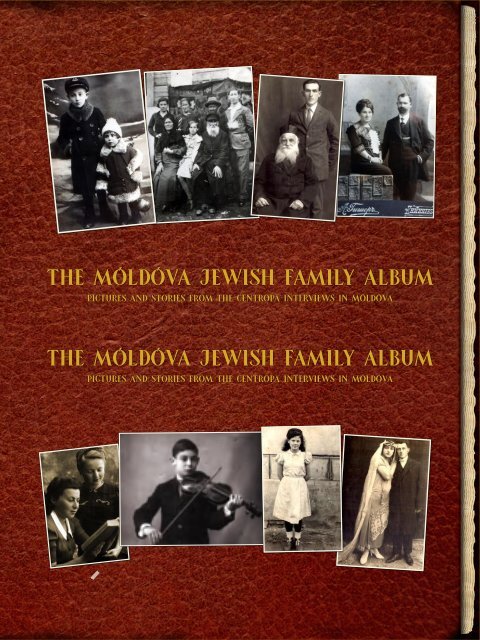

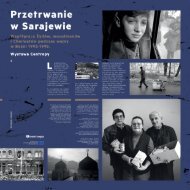

![Trans.History - The Moldovan Jewish Family Album - Exhibition Booklet [EN] - revised version](https://img.yumpu.com/59829280/1/190x190/transhistory-the-moldovan-jewish-family-album-exhibition-booklet-en-revised-version.jpg?quality=85)
